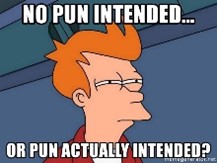Are you looking for a way to draw people's attention to a pun you make in a speech or an essay? You can use "no pun intended" to display your comedy prowess. This post unpacks the meaning and origin of this expression.
Meaning
The expression "no pun intended" means that you want to draw people's attention to a pun you just dropped in your writing or speech. By saying "no pun intended," you're doing the opposite of what you say. By mentioning the pun, you're drawing people's attention to it and the need for them to pay attention to it.
Typically, the pun will have a humorous effect on the writing of the speech. It's interesting to note that the metaphrase is a pun itself. The "un" in "pun" attaches itself to the front of the word "unintended," making for clever wordplay.
Sometimes people use the expression to mean "no lie" or "no exaggeration," but that's not the correct use of the saying. Most people will use this expression in formal or informal speeches addressing a crowd.
Example Usage
“I can’t stand it when presenters on TV say ‘no pun intended,’ right after using a pun. It’s such lame humor, and they need to come up with new ideas.”
“Look at how that guy works out like his like depends on it. It’s like he’s trying to exorcise his demons, no pun intended.”
“You want me to go out with a skinny guy? No way, there’s a very slim chance of that ever happening. No pun intended.”
“Joe Biden really trumped his opponent in the 2020 election, no pun intended.”
“Do you think that the fighter will win the championship belt tomorrow? I think he has a fighting chance. No pun intended.”
“We’ve been waiting for someone to collect the trash for days. What do we pay taxes for? The town council is garbage, no pun intended.”
“I was a doctor for twenty years, dealing with people's health problems day-in-day-out. Then one day, I lost patients with it. No pun intended.”


Origin
The expression “no pun intended” originates from the word pun, which has been around since the 1660s. Some experts believe the word pun originates from the Italian word, “pundigron,” an alteration of “puntiglio,” meaning “trivial equivocation or objection.”
This word comes from the Latin root “punctum,” meaning to “point.” “Pun” likely came into slang in the period after the Restoration. Language experts believe the phrase “:no pun intended” originated in the 1800s, as a playful expression featuring in writing or speeches where the author or speaker wants to create wordplay or double-entendre.
The earliest pun known in writing comes from a mid-1800s tale about a turkey. The story describes the antics of the turkey as “fowl play,” making a pun on the word “foul” and “fowl.”
Phrases Similar to No Pun Intended
- Unknown.
Phrases Opposite to No Pun Intended
- Pun intended.
What is the Correct Saying?
- No pun intended.
Ways People May Say No Pun Intended Incorrectly
Some people may say “no pun intended” when referring to similes and metaphors. The pun is a unique piece of irony in English, and it’s a good thing to understand its use before you put your foot in your mouth.
Acceptable Ways to Phrase No Pun Intended
You can use the phrase “no pun intended” in writing and speech. The term is suitable for social and professional use, usually in speeches where the speaker tries to break the ice with the crowd. When someone says “no pun intended,” they draw attention to the pun, creating the opposite reaction of what they say.
It’s sort of like telling someone, “don’t look behind you,” because you know their first reaction will be to look behind them. By drawing attention to the use of the pun, you are telling people to focus on it and admire the joke or irony in it.